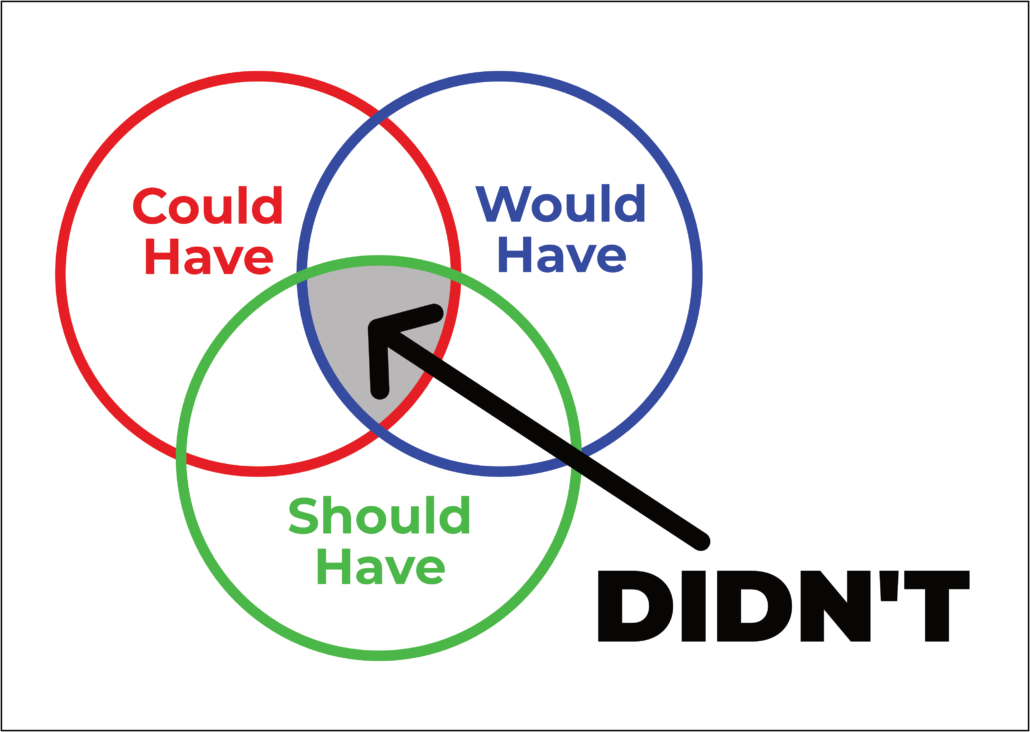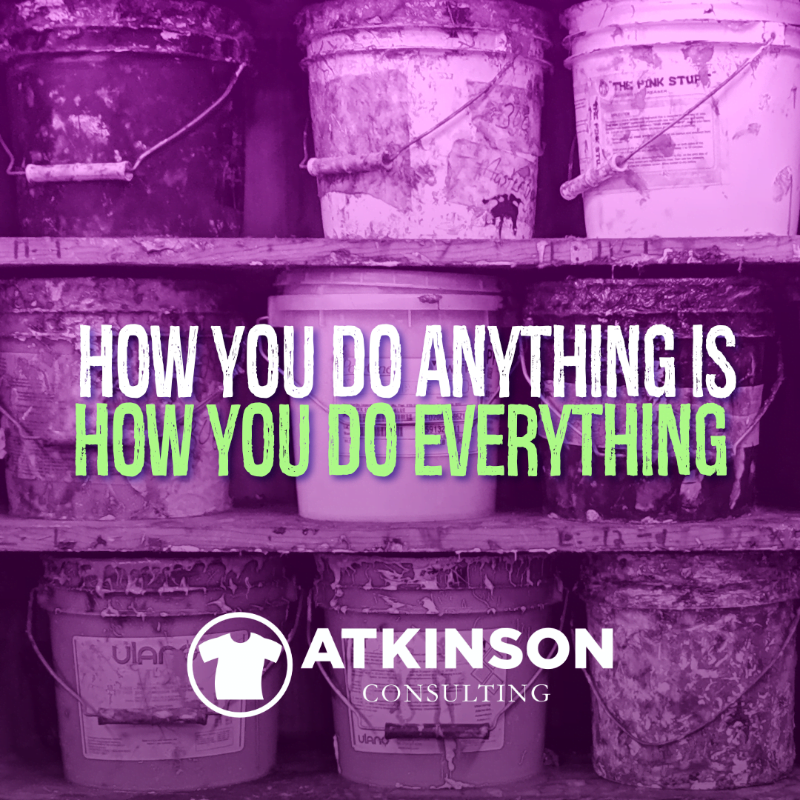Today, I want to point out a personality quirk. Of you. Me. Everyone you know. It can be summed up in one phrase:
“How you do anything, is how you do everything.”
My friend and mentor Mark Coudray said this about a week ago on a conference call. As soon as it was mentioned I immediately jotted it down. I think it is a genius-level way to identify your mindset.
Why?
Well for starters, I think it drives to the heart of why some people can’t get to the level of success that they seek. Some folks are at insane levels of over-achieving. Others never seem to go anywhere or get started.
I think it fits.
Reasons Why You Are Stuck
There are plenty of reasons why people never get to that mythical “next level” of change they are seeking. Here are ten reasons based on my own observations of myself and others:
- Blame others instead of taking responsibility
- Never start
- Don’t listen or follow instructions
- Can’t manage time
- Can’t hold others accountable
- Become distracted easily
- Don’t seek help or guidance
- Have a negative attitude
- Want 100% change now, instead of realizing it’s a 1% a day habit
- Don’t know your numbers
What would you add? Do you have a reason why you feel your business or you personally are stuck in a situation that I didn’t list?
I certainly can’t name everything. That would be a long article!
Here’s What I’ve Noticed
We are the source of our own problems. It’s ok to admit it…because that allows us the opportunity to grow and evolve.
Businesses that have problem employees, most often enough have managers or leaders that have challenges with how they lead.
If you can’t manage to use a watch or a calendar, chances are you can’t stay on schedule very well.
People that “can never find the time”, aren’t as successful as those that make time for what’s important to them.
So let’s be honest here. What’s holding you back?
Blame Others Instead of Taking Responsibility
This is a big one for me, as I see this constantly.
It is incredibly easy to point a crooked finger at someone, something, or some “other” as the reason why things are the way they should be in your life or business.
In the “How you do anything” mindset, the constant sport of blaming others only produces a negative result. Blaming will never elevate performance, or make something a success. It certainly won’t alter your future in a positive way.
It’s just an ax chopping down a tree for the sake of the sound of timber falling.
There are reasons why things happen. If you don’t like the position or results that you find yourself in, take responsibility. Own up to the problem. “It’s my fault. Let’s fix it.”, goes a long way in producing positive results by becoming a better foundation for a mental shift for that effort.
Resolving the challenge could take five minutes or five years. The solution begins with starting the action.
Never Starting
There are plenty of people that want a different future, and may even know how to achieve it…but they don’t start on the path to get where they are going.
It is the first step that is always the most difficult.

Later, if you get to that introspective point, your journey can be summed up in the Venn diagram above:
(Could Have) + (Would Have) + (Should Have) = Didn’t
This is all about answering your “Why”. Why didn’t you:
- Hire better people?
- Close more deals?
- Produce better quality?
- Stay on track?
- Learn something new?
- Make more time?
- Hit your goals?
- Fill in your excuse here ________________________?
There are answers over the horizon, beyond where you can see now.
To achieve a positive result that makes you happy and proud, you are going to have to do something you don’t normally do. It’s your normal that is holding you back.
Start.
Don’t Listen or Follow Instructions
Take it from me, the answers are out there. Are you listening?
Hell, are you even asking questions?
Your staff probably has some great ideas on what to change or how to run the business better. Are you talking to them? What about listening to what they have to say?
If you want to have better results in your business it helps to understand why you are making that change in the first place. This happens through the act of listening.
I’ve seen it countless times. For example, the shop wants the Production team to run with an on-time schedule. Yet, most of the challenges with managing that are farther up the food chain. It’s in how the art is built. Maybe even in the types of jobs you take. Little is done, because it is easier to dogpile on the Production folks and blame them than it is to correct or change to new ways to make the shop run more efficiently.
There are plenty of resources out there including the ones on this website. You can go to trade shows, read books, watch videos, talk to your customers, suppliers, and industry friends.
You should be constantly growing and seeking out new information.
Stagnation = death. Don’t just sit there, do something!
Can’t Manage Time
This is the number one excuse I hear.
“I need to do something, but I just don’t have the time.” I’m throwing the bullshit flag on that one.
Let’s face it. You have the time. You can make the time. It’s simply not a priority.
Learn to prioritize. Use a calendar.
“How you do anything is how you do everything.”
So, are the type of person that is constantly arriving late? I’ll bet you miss payments too.
You would have signed up for that class, but you forgot and the window for registration closed.
Last year you wanted to learn how to __________________________, and you still haven’t started.
Here’s what I want to you to do. Let’s focus on one thing. What’s the number one thing you need to accomplish this year? This month? This week? Today? Before 9:00 am?
Are you able to list one thing?
Yes? Good. Do that.
No? Call me.
Can’t Hold Others Accountable
Here’s another one that is rampant in our industry.
Shops post pictures, videos, and stories of their employees with flagrant workplace misdeeds. Complaining all the time about the problem, and asking the group “what would you do?”
Hey, there’s nothing wrong for asking for advice. That’s great. Keep doing that. Bring it.
However, accountability starts at the top. This is an on-purpose, rule-driven, treat everyone fairly, leadership challenge.
“How you do anything, is how you do everything.”
When the tiger has teeth, people are scared of being bitten. You have to enforce your rules.
A no cell phone policy is exactly that. If you are on your cell phone when you are not allowed, you will be in trouble. Keep at it, and you’ll lose your job.
Too many tardies? They can’t seem to make it to work on time? Write them up, suspend and then fire them for being late. I’ll assure you that the problem will stop.
You get the picture. Plus I get to use my favorite Jocko Willinek quote here. “It’s not what you preach, it’s what you tolerate.”
If you want better, you have to expect better. Raise the bar.
Become Distracted Easily
“Hey, look…a squirrel!”
How many things are you trying to do at once? I know for me, many days feels like I’m juggling 50 balls at the same time. And at least three of them are on fire.
It’s easy to start working on one thing and then something pops up and you dive into that, regardless of the importance of the new item.
Does this sound familiar?
“How you do anything, is how you do everything.”
If you find yourself pinballing from one challenge to another, and this leaves you befuddled and exhausted I have a plan for you to try. I know it is going to sound crazy.
Just do things one at a time.
To do this, schedule the activity when it makes the most sense. Try blocking off chunks of time for similar tasks.
Need to return phone calls? Do all of them in one block of time before the end of the day.
For artists, make changes the first thing in the morning, right after lunch, and at the end of the day before you leave. In between, work on new art.
You get the idea. In fact, the more you start scheduling the work and sticking to it, the easier it will become to handle your important tasks.
Other Distractions
However, all the scheduling in the world won’t amount to much if you can’t stick to it because you become distracted by other noise.
Our cell phones are wonderful devices, but they can be incredibly destructive to productivity if you let them.
How often are you posting on Facebook, or checking Instagram? During your non-essential time, or when you should be doing something with a higher time value?
If you need to, find where the “Mute” button is for notifications and only check once or twice a day. On some apps, this is also called “Ignore”, which usually is a good thing to do if the commenting is more social and less business-related.
Don’t Seek Help or Guidance
We have this voice in the back of our head that whispers to us, “Hey, you can figure this out on your own” or “I can’t let anyone know I don’t know that.”
A good chunk of time we need to silence that whisper and seek help or guidance from someone that’s been there before.
Using a mentor or a coach is a great way to flatten any learning curve. It’s difficult to admit that you might need help. I know.
Sometimes I’m the same way. However, every time I have asked for help or a “What do you think about this?” from someone, it has helped me navigate the situation more successfully than if I tried it myself.
“How you do anything, is how you do everything.”
Imagine how much faster your progress would be if you pulled in experts or people more skilled at something than you to show you the ropes?
All you have to do is simply ask.
Have a Negative Attitude
I know you have heard the phrase “Your attitude determines your altitude”.
There have been plenty of studies that show that people with positive attitudes regularly outperform those with a negative mindset.
In his book “Predictable Revenue”, Aaron Ross has a great quote “Failure is just your judgment on an experience. Because there are no failures, only learning opportunities.”
Let’s compare one shop owner to another with the same problem. For the first one, sales are down and of the last ten sales opportunities, the shop only closed three of the deals. That’s a 70% failure rate! Insert doom and gloom negative attitude here.
The other shop owner has a different mindset. Of the last ten sales opportunities, the shop only closed three of the deals. They then used the three winning deals to focus their approach to attract other sales leads that fit them better. The shop also knows their Lifetime Customer Value and having three more customers that truly appreciate what they have to offer is better than wasting time chasing customers that don’t.
“How you do anything, is how you do everything.”
Are you marketing and valuing the customers you have and building the relationship with them? Do you know why your customers do business with you? What is your “Unfair Advantage” you have over your competition?
How would you rate your business attitude? Positive or Negative?
How can you improve it?
Don’t Know Your Numbers
Data and metrics help you understand what’s going on. Yet, businesses in this industry rarely know their numbers.
- What is your Downtime percentage?
- Do you know what it really costs you on average to decorate one impression?
- What’s your sales closure rate?
- How many dollars has your website generated this month?
- Who are your best-performing employees? What about the worst?
- What else are you not tracking? What are the KPIs that should matter to you?
“How you do anything, is how you do everything.”
To completely understand and improve anything you first need to comprehend what’s going on. Want to lower your costs? Ok, what does it cost you? Want to improve your speed? Ok, how fast can you do something?
Gut feeling, intuition, your best guess, or any other non-scientific babble won’t work. “You can’t manage what you don’t measure” is absolutely true.
This means if you aren’t measuring, you aren’t managing whatever is your problem.
Compromising is Condoning
Sure, a lot of this article might be about other people. Not you, right?
Maybe you don’t own the company, and the founder has these traits or what I like to call “opportunities for improvement”.
It still leads to disorder.
Your business isn’t run as effectively as it should because of this mindset.
“How you do anything, is how you do everything.”
Here’s a baker’s dozen list that I want you to use to reflect on your company. Think about how each of these ideas translates to problems that you are spending time and resources fixing.
- Uncertainty
- Variability
- Errors
- Incomplete Information
- Chance or Luck
- Clutter
- Disorganization
- Time
- Randomness
- Fragility
- Lack of Knowledge
- Trust
- Confusion
Map out what you need to do to change something for the better. Even if you can’t implement it now. What would you change?
Need help?
Let’s talk.
“Good, better, best. Never let it rest. ‘Til your good is better, and your better is best.” – St. Jerome
“Only I can change my life. Nobody can do it for me.” – Carol Burnett
“What you do today can improve all of your tomorrows.” – Ralph Marston





